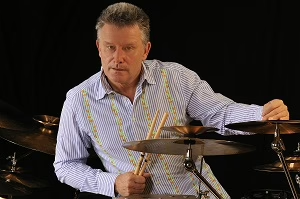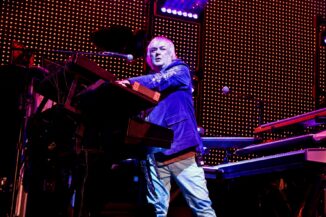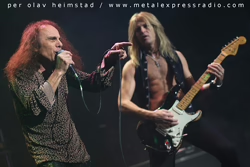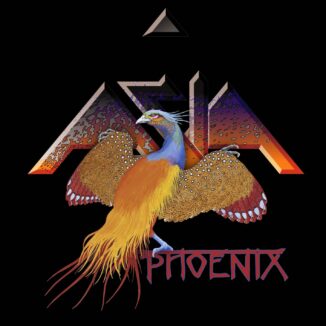
Carl Palmer is one of the most highly respected drummers in the business selling huge quantities of records with Prog legends Emerson Lake and Powell before forming supergroup Asia and topping the US charts for over two months. Mick Burgess chatted to the legend about his upcoming tour, and much more.
You’ll be starting your Twist of the Wrist tour soon. Are you looking forward to getting out on the road in the UK again?
I always enjoy touring over in the UK that’s beyond a shadow of a doubt. It’s always exciting playing here as this is where I’m from. I can’t wait to get started although I have played a few shows already including one at the Great British Rock and Blues Festival in Skegness and that was a lot of fun. We tried a few things out there so the tour should be interesting.
How many dates will you be playing?
We’ll be playing about 16 shows I think. We’ll be covering the country from top to bottom.
You have a huge catalogue of music to choose from. Will you be focussing on the ELP side of your career?
We’ll play a lot from ELP including “Pictures At An Exhibition” and we’ll play “Tarkus” some nights. We do take requests but I think we’ll play “Knife Edge”, “Trilogy” and of course we’ll do “Fanfare For The Common Man” which was written by Alan Copeland. We’ll play “Welcome Back” at the front of the set so we’ll be playing quite a few from my ELP career. I’ll also be doing a song called “America” that was the first song I saw Keith Emerson do in The Nice. I’m also going to do a piece by King Crimson called “Schizoid Man” and that was actually the very first piece I played with Keith and Greg Lake but I don’t know why as we never played it together again !! That may well be in the set so that will be a complete history of music that we played together.
That music is some of the most complex and intricate music around. How difficult was it finding musicians who were up to the job of tackling ELP’s heritage?
I’ve been doing this now since 2001 so we are now 13 years in and today there’s a great many musicians who can play this type of music mainly because there’s more academies and institutions that specialise in music. I think now there’s many more great guitar players than keyboard players but back in the ’70s there seemed to be more great keyboard players.
Who do you have in your band for this tour?
Paul Bielatowicz has been with me for 10 years and Simon Fitzpatrick who’s been with me for 3 years is on bass.
How long did you spend rehearsing for the tour?
We played in Brazil a couple of weeks ago so we have already been playing together recently but we’ll have another couple of days rehearsal before the start of the tour to finalise what we’ll be doing. We will be working on “Jerusalem”, the hymn that once got banned by the BBC. We’ll be introducing “The Stick” for that which is a 12 string bass guitar so that should be interesting.
On the tour you go out and meet the fans after the show. This is no paid for meet and greet that some bands do but it’s just you connecting with your fans. Is it important to you to get out there and meet your fans after the show?
I’m not very quick at getting changed so I’ll need a good 15 minutes to get out there and I will sign anything that’s bought on the night and any two albums from my past and if anyone wants to get a picture then I’ll happily do that. I think it’s a good thing to do to meet the people who come to my shows and listen to my music. I enjoy doing it.
Do you take in their feedback and comments?
Some people will like it and some people won’t so I really only judge myself. If someone says I am the greatest drummer they’ve ever seen I don’t believe them so I don’t really get influenced by what people say whether it’s good or bad.
You’re playing at The Cluny in Newcastle on 12th March. How do you find the crowds up North?
Audiences are different everywhere you go in the world some of them are really up for it and others quite laid back. Probably the hardest audiences to play for are in London, they sometimes take a while to get going but usually get there in the end but I always get a great reception up north in Newcastle.
Newcastle is of course the place where you recorded your classic live album Pictures At An Exhibition at the City Hall in 1971. What are your memories of that show?
It’s a bit too long ago for that but I do remember that it was a great show. We chose that venue as it was convenient at a time the mobile recording equipment was available. There weren’t that many mobile units in those days so we had to pick a show when we could get hold of one and Newcastle just happened at the right time. Fortunately we played a great show that night.
Mussorgsky wrote the original piece in 1874. How did you adapt his work to suit ELP?
Any piece can be adapted; it’s just a case of what you leave out and what you leave in and what you consider important in the piece of music. It would have been harder to do it on guitars as you can’t get all the harmony structures going on whereas you can with the keyboards. There were only three of us so we couldn’t have anyone that wasn’t playing the right stuff at the right time. Everyone had to be paying attention all of the time. Pictures At An Exhibition was something I’d been listening to since I was 7 or 8 years old. I know Keith loved it from a young age too so we both knew it very well but it was hard to arrange it for a three piece group and make it exciting but I think we pulled it off.
You got a co-writing credit with Mussorgsky which is pretty good going bearing in mind the 100 year gap!!
Yes of course. It was great to see that on the credits.
Back in the day ELP were known for their huge entourage of trucks and equipment. I take it your travel to the Cluny will be a little lighter?
It was considered extravagant back then and we carried a lot of stuff but if you look at U2 and the Rolling Stones today it was absolutely nothing compared to them. We just tried to set the blueprint for Rock ‘n’ Roll for what performances could become and a lot of bands jumped on it. The places I play now don’t allow you to do that. The expense would be astronomical and I just couldn’t do it in my position and not many bands can. I’m not playing in big arenas with this show so I don’t need to carry that amount of stuff but the intensity of the show is still there.
Keith Emerson and Greg Lake reformed ELP with Cozy Powell in 1986. Why did you not rejoin them at that stage?
I would have been very glad to go back with Greg and Keith but I needed four weeks before I could return as I’d been contracted to make an album and I had three weeks of recording left so I told them it would be four just in case things ran over, which they did. They decided they couldn’t wait four weeks after we hadn’t played together for 10 years so they got in another drummer, Cozy Powell which was fine by me. The way I looked at it was that they were promoting my back catalogue. I let them use the logo and didn’t stop them doing anything but I thought it was a little petty that they couldn’t wait. In the end they went out and promoted my work so it was win win and I couldn’t lose financially really. It was all very strange but I had no problem with them using Cozy as he was a good friend.
You last played together again for a one off 40th Anniversary show at the High Voltage Festival in London in 2010. How did it feel playing with your old band mates again?
We hadn’t played together at that stage for over 12 years and it went OK. It was only intended as a one off and I didn’t want to do any more personally. I think it was good that we did it and we said goodbye to our audience. We didn’t sell as much as ZZ Top the night before but we played on a Sunday night and people have jobs to go to on a Monday. There was a curfew at 10:30pm and we couldn’t use the fireworks we wanted to and there were one or two problems but overall it was OK. It wasn’t the greatest gig that we’ve done as we hadn’t played together for so long but the crowd seemed to like it and it was a night of nostalgia for them.
Will you be fitting in any drum clinics while you are on the road?
I don’t really do those anymore. I do the odd master class for about 20 hand-picked drummers now and then and do some teaching in schools depending on my schedule. I do lecture at Southampton University too but I’d rather be out playing my music.
You are also an original member of Asia. How is the new album, Gravitas, coming along?
That’s all done and finished now and it’s scheduled for release at the end of April. It’ll be classic Asia and no real changes to what we do. We play melodic Rock and the album will be what our fans expect from us. It’s what Asia is, there’s no big changes.
Your original guitarist Steve Howe left recently and has been replaced by a relative newcomer Sam Coulson. How did you find Sam?
He was recommended to us by a friend so we checked him out and really liked what we saw. We played together a couple of times and we got on really well so we invited him to join the band. He hasn’t written on this album as John Wetton and Geoff Downes had already done that. This is the first album with him and we’re all pretty positive.
When do you hope to go out on the road again?
We hope to tour the UK in June. We’ll do 10 dates in Japan then head to The States in September. We’re all looking forward to playing together again and playing some of the new songs too.
When you first formed Asia in 1982 with John Wetton, Steve Howe and Geoff Downes it was seen as a Prog Rock supergroup. Did it start initially as a project between musicians or did it develop naturally as a band?
We were initially put together by Geffen records as at the time MTV was becoming popular. ELP and Yes and those bands who we had been playing with were coming to an end after Punk and we wanted to do something different. Asia was never meant to be a Prog Rock band it’s more commercial and middle of the road and we played a more streamlined, slicker type of music than we had done before and that seemed to strike a chord with the MTV generation. We enjoyed it while it lasted and got the original band back together in 2007 and released three more albums until Steve left last year but we’re still continuing as we love what we do.
Did the success of your debut spending 9 weeks at No.1 in The States surprise you?
That was incredible. We had a big first album that we never dreamed of having but that put pressure on us to repeat that success. We keep trying and you never know but times have changed but at least we’re still popular on the touring circuit especially in America.
Your last full album for the band, Astra before you originally left was disappointing in terms of sales compared to the first two albums but it has some of your best material. Do you think this album is somewhat overlooked in your back catalogue?
That got buried by the label at the time and there was some arguing going on so it didn’t get the promotion that it needed. These things happen in this business which is a shame as there were some good songs on there. We also had some problems within the group at the time which didn’t really help.
Can you see the original four playing together again in the future? Is the door open for Steve to return at some point?
We haven’t really discussed that. Steve is busy with Yes at the moment and I don’t think he’d want to come back but you never know.
As well as your own solo work and Asia you also have your own art project the rhythm on canvas “Twist of the Wrist” collection. Can you tell me more about this?
I think if you go to carlpalmerart.com that explains is better than I can and it’s all self-explanatory on there. It’s basically artwork created entirely by rhythm. The first of my catalogue is now completely sold out and that’s just over 200 pieces but I’ll be releasing a new catalogue in March. I’m really happy with how it’s going so far and it’s something I’ve wanted to do for a while now. I sell them online, at my concerts and at art galleries.
What advice can you give to a kid wanting to learn to play the drums?
The most important thing is getting a good teacher. Get to know who the teacher is, what experience they have and just make sure you enjoy yourself. It’s quite difficult getting started and a good teacher will be able to keep the interest of the student going through the times where it seems to be unrewarding. Once you get past that point it just seems to take off and open up. The teachers that I have had were so good that they inspired me for the rest of my life.
You almost played on the latest Black Sabbath album. What happened there?
Tony Iommi who is a good friend of mine asked if I’d be interested in doing some recording with him. I said that I could do it. Tony then got ill and by the time he got well I was back working with Asia and the ELP Legacy band so it never got any further. It’s a shame as I’d have loved to have done that.
You have your own tour coming up and the new album by Asia too as well as your art project. Do you have plans for anything else this year?
Most of the year will be spent touring with Asia and my own ELP Legacy so there’s not a lot of room for much else. It’s going to be a busy time but I may be able to fit in a holiday at some point.
For more information and tour dates visit: carlpalmer.com




Be the first to comment